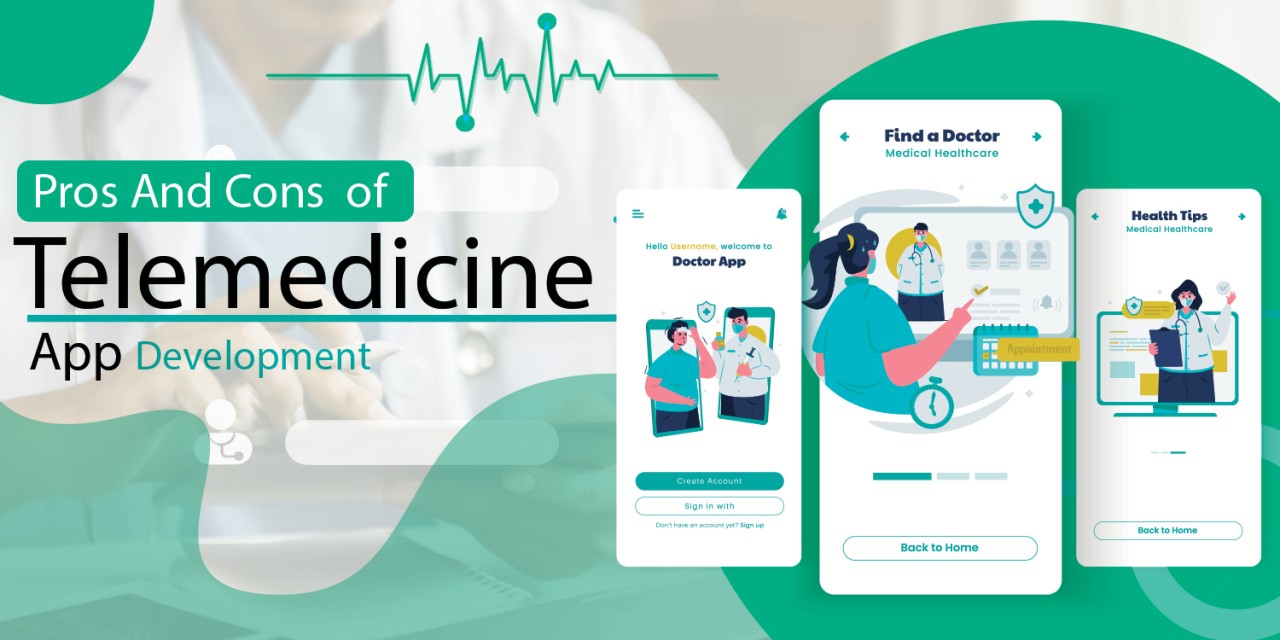Pros And Cons of Telemedicine App Development
Telemedicine is in great demand as the healthcare industry requires modern solutions. However, many investors need clarification about the demand change and supply of telemedicine apps and how they can engage the user. If you are an entrepreneur or investor, then you need to understand the pros and Cons of telemedicine app development and how it can change the user experience. However, the pros and cons of telemedicine app development can differ for doctors and investors who are investing in providing a platform for doctors and patients.
Therefore, we will conclude the generic pros and cons of telemedicine app development and give you an idea of what are the factors that affect the development process. Additionally, also understand the market demand and use cases of telemedicine app development so that you can think wise and create an app of your choice. So wait no more, and let’s dive into the importance of telemedicine app development and the pros and cons that affect the investment and overall experience of the investor.
Use Case of Telemedicine
Telemedicine apps are used to provide healthcare connected through providers, and patients come across each other without personal meetings. These apps help patients in rural areas, those who are mobility challenged, or frequent checkups who may need more regular attendance. Key use cases include:
- Remote Consultations: Through teleconsultations, patients can talk face-to-face with doctors without going to clinics or hospitals. They do not need to waste expenses and time on travel.
- Chronic Disease Management: Patients with chronic conditions can use regularly updated and easy-to-use data to help their doctors.
- Mental Health Support: Services provided by telemedicine platforms are secure, private environments for therapy sessions or mental health consultations.
- Post-Surgery Follow-ups: Remotely monitoring recovery allows doctors to keep patients’ checkups to a minimum.
- Prescription Management: After patients have consultations, they can send e-prescriptions that streamline medication management.
Pros of Developing a Telemedicine App
Lets take a look at telehealth pros and cons and factors affecting the overall user experience.
1. Increased Access to Care:
Telemedicine Apps enable healthcare to reach more people, especially those in rural or underserved areas. Such patients can consult doctors remotely, which is more convenient for those with transportation problems or limited mobility.
2. Cost Efficiency:
Telemedicine apps enable you to operate without the space and cost of a physical clinic. This method helps healthcare providers cut operational expenses, provide cheaper services, and improve margins.
3. Convenience for Patients:
It is one of the profound benefits of telemedicine apps that allow patients to schedule and attend appointments from their homes. Taking healthcare back into your own hands saves time and effort and is especially helpful for people who have to balance family time with their busy work schedules.
4. Time-Saving for Doctors:
Virtual appointments can also be faster (and with fewer people in the office), so doctors can see more patients each day. It simplifies things and makes your visits more efficient and more useful to healthcare providers because they can juggle consultations while getting things done.
5. Remote Monitoring:
Often, telemedicine apps integrate with wearable devices that enable real-time health tracking. This is a great way for doctors to monitor patients remotely, especially for chronic conditions like diabetes or heart disease.
6. Reduction in No-Shows
Telemedicine increases the number of patients who attend their appointments because they don’t have to travel. It also lowers the rate of no-shows, which improves scheduling and clinic performance.
7. Better Continuity of Care:
Telemedicine for doctors allows to deliver regular care to patients without face-to-face appointments. It is important to be able to handle ongoing health issues and maintain the course of a treatment plan.
8. Improved Access to Specialists:
Patients can consult with specialists in other regions or even countries. This is very useful for someone who can’t get specialized care locally but requires an expert opinion.
9. Scalable Service
Expanding the telemedicine platform to meet growing demand does not require the ability to rapidly expand the physical footprint. This scalability allows healthcare systems to process large patient volumes during peaks, such as flu seasons and the pandemic.
10. Patient Satisfaction:
Telemedicine is a more flexible and easier way for patients to get care. It can lower commutes and waiting room fees, which results in higher fulfillment and encourages them to keep optimally engaged with their cell healthcare providers.
Cons of Developing Telemedicine App
1. Data Privacy Concerns
Handling sensitive health information is essential advantages of telehealth apps and their potential to secure platform from cyberattacks. It’s expensive to ensure that patient data is secure by using a service that has advanced encryption and complies with data privacy regulations.
2. Regulatory Hurdles
Telemedicine apps must follow different healthcare regulations in different regions, such as HIPAA in the U.S. and GDPR in Europe. While this can be complex and require significant legal and technical expertise, it is necessary to navigate these regulations.
3. Technology Accessibility
This allows some patients who need more reliable internet or smartphones to utilize telemedicine services and technology. However, it creates a digital divide, keeping some people behind and restricting their use of technology.
4. Limited Physical Assessments:
Some medical conditions require physical exams that cannot be completed virtually. On the other hand, diagnosing a skin condition or taking a blood sample requires in-person visits, which means that telemedicine can’t completely replace regular disadvantages of technology in healthcare.
5. User Adoption
Only some people in the patient community or with healthcare providers are tech-savvy. However, some can take longer to adapt to using telemedicine platforms than younger people or those who aren’t used to digital tools.
6. Dependence on Internet Stability
Video consultations are a key feature of telemedicine, and they rely heavily on good, stable internet connections. Poor connectivity can disrupt areas with good connectivity, leading to poor quality of care and the complexity of communicating well between patients and doctors. As a result it become a communicating gap cons of telehealth for both users.
7. Initial Development Costs
Building a telemedicine app involves heavy investment in technology, security, and regulatory compliance. The development process can be costly, especially for smaller healthcare providers with poor financial conditions.
8. Reduced Personal Interaction
Another disadvantages of telehealth is that virtual consultations may need a more personal touch than in-person visits do. However, patients may feel that they need to work better with the healthcare services they have or that they are not getting proper care, meaning they are less likely to use the service every time.
9. Licensing and Cross-Border Issues
Usually, physicians are licensed to practice only in certain areas of the country. Licensing laws will limit where healthcare providers can offer their services, leading to telemedicine services that must be provided across state or national borders.
10. Integration with Existing Systems
Talking to your patients via a phone or laptop, at home or somewhere else, has been a reality for several healthcare providers who already use electronic health record (EHR) systems. However, integrating telemedicine apps with their existing systems can be complex. Sometimes, custom APIs are needed, which increases development costs and time.
Market Demand for Telemedicine App Development
The demand for telemedicine app development is at an all-time high as healthcare providers look for more convenient ways to provide care. With telehealth markets at $85.2 billion, it is obvious that telehealth is much more than a trend; it is a crucial tool to manage patient needs. With chronic conditions and a rising aging population comes a practical solution for delivering care remotely: telemedicine apps. Opportunities are created for patients and healthcare providers to manage more patients without the necessity of expanding physical infrastructure. So when you relate the Pros and Cons of Telemedicine app development you would be able to make right decision of investing in it.
The telemedicine market is estimated to grow at a CAGR of 17.9% from 2017 to 2032 and reach a value of $427.9 billion by 2032. The reason this growth is happening is that we need to drive care costs down, fill staffing shortages, and widen access to specialized care. Telemedicine doesn’t just change healthcare; it’s making healthcare more accessible, more cost-effective, and scalable. As such, benefit of telemedicine app development is a tremendous opportunity for providers and investors alike to keep a foothold in the increasingly changing healthcare environment.
Tips To Find The Best Telemedicine App
Beside understanding Pros and Cons of Telemedicine find out important factors to consider while choosing telemedicine app development:
- Security: Ensure the app uses secure methods for transmitting personal and medical information.
- Privacy: Check the app’s privacy policy to ensure your information will be protected.
- Ease of use: Choose an app that is easy to navigate and understand.
- Compatibility: Make sure the app is compatible with your device and can be used with your current internet connection.
- Services offered: Look for apps that offer a wide range of services, such as virtual consultations, prescription refills, and appointment scheduling.
- Insurance coverage: Confirm if your insurance company covers the app or if it offers a way to pay for the service.
- Reviews: Read reviews from other users to get a sense of their experience with the app.
- Cost: Compare the cost of the app with other options available.
Conclusion
Telemedicine app development is changing the entire aspect of healthcare by delivering affordable and comfortable services. It enables providers to see more patients, decrease operational costs, and match the increasing need for care. Challenges include system integration, data security, and regulatory hurdles, but the benefits are well underway. Healthcare providers can add significant value to boost satisfaction and patient engagement by putting telemedicine solutions as the top priority. Modern healthcare is where it is right now with telemedicine.
FAQs
Q1 What is telemedicine?
Telemedicine uses technology to provide remote medical care through video calls, phone calls, or messaging, allowing patients to consult healthcare providers without in-person visits.
Q2 What are the benefits of telemedicine apps?
Telemedicine benefits include increased access to care, reduced travel costs, convenience, improved efficiency for providers, and better management of chronic conditions.
Q3 What challenges do providers face in developing telemedicine apps?
Challenges include ensuring data privacy, navigating regulations, integrating with existing systems, and training users to use the technology effectively.
Q4 How do telemedicine apps comply with regulations?
Telemedicine apps must follow regulations like HIPAA and GDPR by implementing data encryption and secure communication to protect patient information.
Q5 What is the future of telemedicine app development?
The telemedicine market is expected to grow significantly as advancements in technology enhance capabilities and lead to more personalized patient care and improved health outcomes with modern technologies of AI/ML.





Content provided with depth information. I will appreciate the entire team’s efforts to provide such informative content.
This is a fantastic post. I like it and appreciate the whole team for this fabulous post. Thanks for sharing with us.
Thanks for sharing. I read many of your blog posts, cool, your blog is very good.